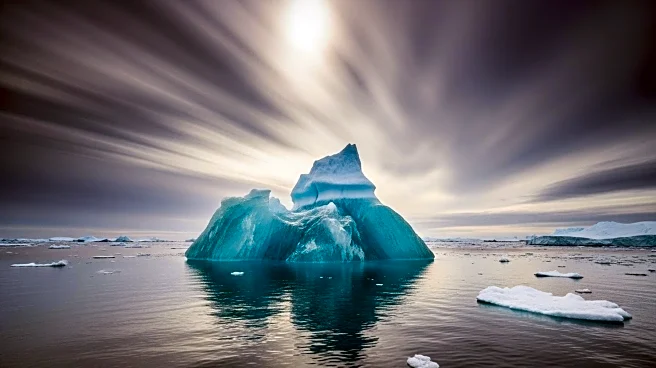What's Happening?
Recent observations in Antarctica have revealed a dramatic rise in atmospheric temperatures, reaching an unprecedented -4 °F, compared to the usual -67 °F for this time of year. This anomaly is linked to a significant decrease in the speed of stratospheric currents, particularly the polar vortex, which is now moving at less than 62 miles per hour. Such phenomena, expected to occur once every two decades, have been recorded four times since the start of the 21st century. The slowdown of the polar vortex is attributed to rising surface temperatures in the Pacific Ocean. These changes are causing unprecedented sea ice loss and affecting marine ecosystems, with significant implications for global sea levels and weather patterns.
Why It's Important?
The changes in Antarctica's climate are indicative of broader global warming trends, with potential far-reaching impacts on global weather patterns and marine ecosystems. The accelerated ice melt contributes to rising sea levels, which can lead to increased flooding and coastal erosion worldwide. The disruption of sea currents affects nutrient flows, impacting fish populations and the broader food chain. These environmental shifts highlight the interconnectedness of Earth's climate systems and underscore the urgency for global action to mitigate climate change. The data from Antarctica is crucial for refining climate models and improving forecasting accuracy, aiding policymakers in developing strategies to address these challenges.
What's Next?
Scientists are closely monitoring these developments to understand their long-term implications. The international community is urged to collaborate on reducing greenhouse gas emissions and promoting sustainable practices to protect vulnerable ecosystems. Initiatives to preserve marine life and address the root causes of climate change are critical. The future of Antarctica's climate remains uncertain, but the urgency for coordinated global action is clear. The response will require efforts across government, industry, and civil society to create impactful solutions and protect the planet's most fragile environments.
Beyond the Headlines
The Antarctic climate changes are not isolated events but part of a larger trend of global warming. The accelerated melting of ice and alteration of atmospheric conditions could lead to more frequent and intense natural disasters, such as storms and floods. Understanding these scientific implications is crucial for developing effective strategies to combat climate change. The challenge lies in translating scientific findings into actionable policies that address the root causes of these climatic shifts. The global response will determine the future of not just Antarctica, but the planet's climate as a whole.









